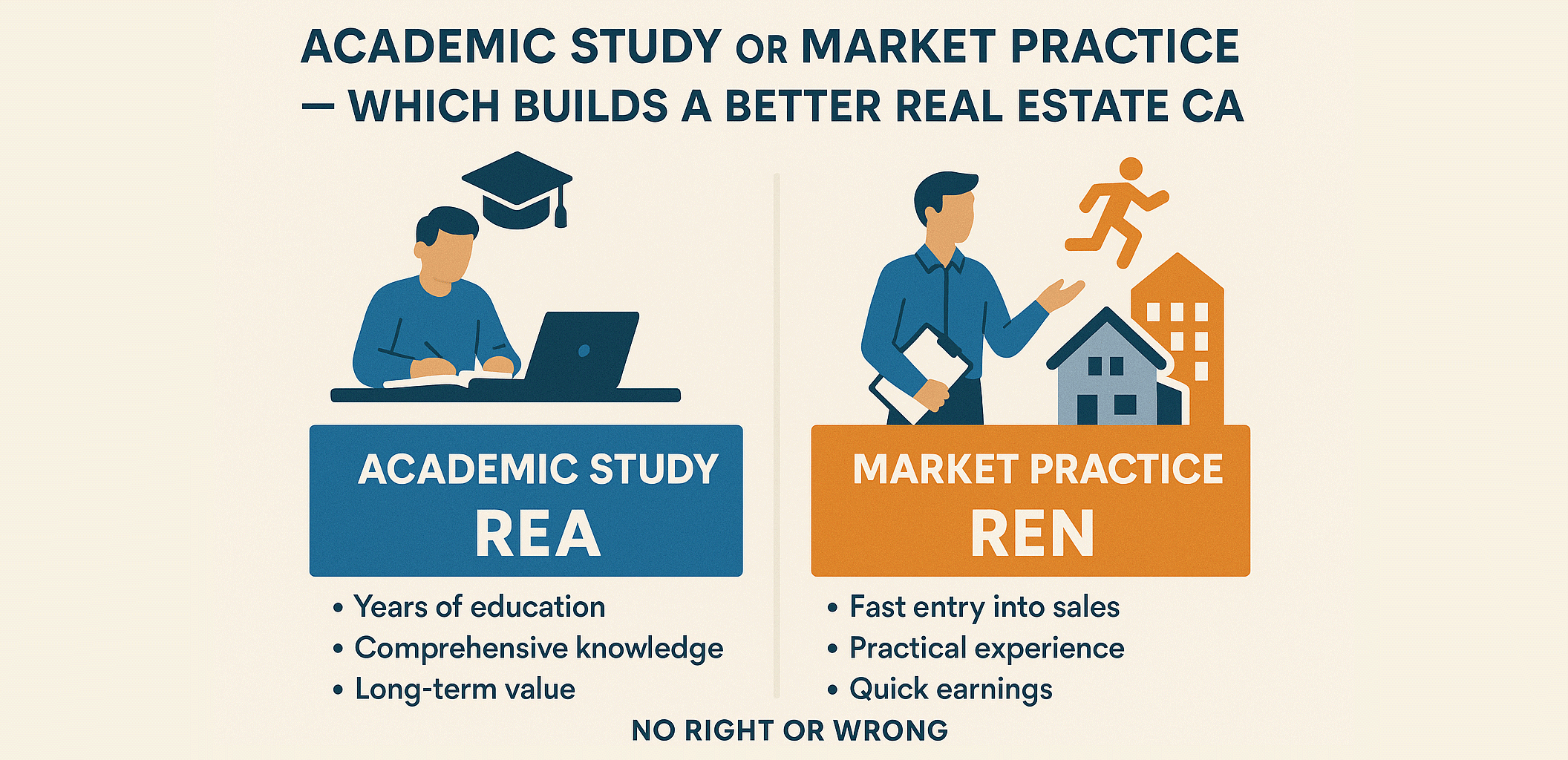REA’s Academic Rigor vs. REN’s Market Hustle in Malaysia

Which Path Builds a Stronger Real Estate Career?
In Malaysia’s real estate industry, professionals generally follow one of two paths — the Registered Estate Agent (REA) or the Real Estate Negotiator (REN).
Both share the same goal of closing property deals, but the routes they take could not be more different.
This difference raises a familiar question: which path leads to a more successful and sustainable career — study first, or practice first?
The Academic Route: The REA (Registered Estate Agent)
The REA pathway is a long-term professional commitment, governed by the Board of Valuers, Appraisers, Estate Agents, and Property Managers (BOVAEP). It is designed to produce not just salespeople, but licensed professionals who can own, operate, and legally represent an agency.
The REA Commitment
To qualify as an REA (blue ID tag), candidates typically undergo several years of structured education and training:
Formal Education
- Pass 12 professional papers (Part I and Part II) under BOVAEP — equivalent to a Diploma in Estate Agency — or hold a recognised diploma or degree in Estate Management or a related field.
Practical Training (PEA Stage)
- Serve as a Probationary Estate Agent (PEA) for two years (or one for degree holders) under the supervision of a licensed REA.
- Maintain a detailed logbook covering real transactions, valuation work, and management experience.
Test of Professional Competence (TPC)
- Sit for a professional interview to demonstrate mastery of laws, ethics, and agency practice.
This process builds strong foundations in land law, conveyancing, valuation principles, property taxation, and professional ethics. An REA is legally empowered to open and manage an agency, sign authority letters, and handle client trust accounts — providing structure, compliance, and accountability to the entire firm.
The Practice Route: The REN (Real Estate Negotiator)
The REN path, by contrast, is fast-track and hands-on. RENs are the market’s frontline professionals — the ones pounding pavements, meeting clients, and driving daily transactions.
The REN Fast-Track
- Certification – Complete a two-day Negotiator Certification Course (NCC) that introduces basic laws, ethics, and industry standards.
- Registration – Join a licensed agency under an REA’s supervision. The agency applies to BOVAEP for the REN tag.
This low-barrier entry allows RENs to start selling almost immediately. They quickly develop street knowledge — mastering negotiation, client psychology, and pricing dynamics. While they cannot open their own firm or manage client funds, RENs are the lifeblood of the market, turning listings into sales and theory into action.
Sequencing Success: Why “Study First” Often Pays Off
While a REN can earn faster, the academic-first (REA) route tends to provide a more secure long-term foundation. The reason lies not in status, but in timing.
| Challenge if Delayed | Why Academic First Helps |
|---|---|
| Cognitive Strain | Complex legal frameworks like the National Land Code (NLC) are easier to learn before professional fatigue sets in. |
| Time & Financial Limits | Years of study and a two-year logbook are easier to manage before family and financial obligations grow. |
| Career Ceiling | Remaining a REN limits progression — no override commissions, no firm ownership. Completing the REA license early removes this cap. |
By securing the REA “E-number” early, a professional locks in both authority and independence before life’s commitments make it harder to pursue.
The Blended Professional: Where True Mastery Lies
In truth, the most capable professionals are those who combine both routes — academic depth and field agility.
The best REAs stay connected to the ground. They use their technical knowledge as guardrails while mentoring RENs and structuring compliant, transparent deals.
The best RENs continuously upgrade their skills — learning valuation, legal awareness, and negotiation strategy — to build credibility and eventually transition toward leadership or licensing.
A strong real estate ecosystem needs both: REAs to uphold professional standards, and RENs to keep the market alive and responsive.
Final Takeaway: Different Paths, Different Priorities
Ultimately, there is no single right or wrong path — it depends entirely on what you value most.
If your priority is to start earning quickly and learn through hands-on experience, the REN route is practical and effective. You’ll gain market intuition, client empathy, and resilience that only real-world exposure can teach.
If your goal is long-term authority, scalability, and professional independence, the REA route is the wiser investment. It demands patience and discipline, but it rewards you with the power to build, manage, and legally lead an agency.
In the end, both paths lead to success — just in different ways.
Practice-first means speed and adaptability.
Study-first means structure and sustainability.
What truly matters is not the route you take, but the commitment you bring to mastering it.











































































































